|
|
|
Sort Order |
|
|
|
Items / Page
|
|
|
|
|
|
|
| Srl | Item |
| 1 |
ID:
079217
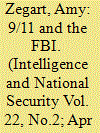

|
|
|
|
|
| Publication |
2007.
|
| Summary/Abstract |
Public discussion about the 11 September 2001 terrorist attacks has focused on the human causes of tragedy - on individual mistakes, failures of leadership, and the power plays between intelligence officers in the field and policymakers in Washington. But closer examination of the FBI suggests that organizational weaknesses are the root cause of poor agency performance. Longstanding deficiencies in the FBI's organizational structure, culture, and incentive systems proved crippling in the 1990s, when the Cold War ended and the terrorist threat emerged. These lingering weaknesses ultimately prevented the bureau from capitalizing on 12 separate opportunities that might have disrupted the 9/11 plot
|
|
|
|
|
|
|
|
|
|
|
|
|
|
|
|
| 2 |
ID:
186403
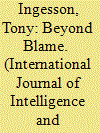

|
|
|
|
|
| Summary/Abstract |
Investigations into intelligence failures are frequently conducted by multiple parties in parallel, and in several important cases, their conclusions have been controversial. In addition, investigations into minor incidents, such as mishandling of sensitive information or equipment, tradecraft errors, or similar events where no major consequences have been detected, tend to be handled internally by the concerned agency, or through limited interagency cooperation. This can lead to missed opportunities to prevent them from developing into major failures. These issues are compared to the investigative procedures employed in the aviation safety sector, where an independent body is responsible for investigating both major failures and minor incidents, with a view specifically to develop proactive measures to prevent repetition. The conclusion presented is that the Intelligence Community could benefit from studying how aviation safety investigations are handled, in order to be more effective in addressing minor incidents at an early stage, and to avoid controversies in investigations of major events.
|
|
|
|
|
|
|
|
|
|
|
|
|
|
|
|
| 3 |
ID:
066784
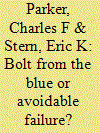

|
|
|
| 4 |
ID:
151774
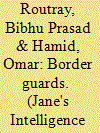

|
|
|
| 5 |
ID:
069211
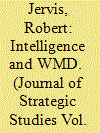

|
|
|
| 6 |
ID:
113407
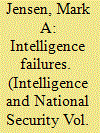

|
|
|
|
|
| Publication |
2012.
|
| Summary/Abstract |
Intelligence failures occur for more reasons than just sloppy tradecraft and are often attributable to decision-makers as well as to the intelligence community. Before exploring the subjective nature of intelligence failures, this article first discusses three foundational concepts underlying them: process vs. product, fact vs. judgment, and prediction. It then outlines major components of intelligence failures: accuracy, surprise, and the role of decision-makers, particularly unrealistic expectations and the use or non-use of intelligence. The article concludes with a discussion of what the intelligence community and decision-makers can do to deal with these three components.
|
|
|
|
|
|
|
|
|
|
|
|
|
|
|
|
| 7 |
ID:
125534
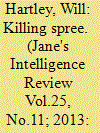

|
|
|
|
|
| Publication |
2013.
|
| Summary/Abstract |
The four day siege of a Kenyan shopping centre targeting civilians could mark a shift in operational tempo for Harakat-al-Shabaab al Mujahideen. Will Hartley examines the westgate mall assault and the implications of Al-Shabaab's link with Al-Qaeda
|
|
|
|
|
|
|
|
|
|
|
|
|
|
|
|
| 8 |
ID:
053638
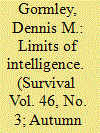

|
|
|
|
|
| Publication |
2004.
|
| Description |
p7-28
|
| Summary/Abstract |
In allocating blame for the intelligence failure over Iraq, critics of the Bush administration focus on former CIA Director George Tenet's bending to White House pressure or the administration's mishandling of intelligence. Supporters of the president downplay White House responsibility and focus instead on the failings of the intelligence community and the possible need for structural reforms. Neither side has it completely wrong – or right. There is substantial evidence that the Bush administration – like many of its predecessors – oversold the threat to sell its preferred policy choice. But any quest to ‘fix’ intelligence merely through reorganisation will be futile insofar as it avoids the more prosaic but more critical matter of intelligence effectiveness. This depends far less on structural reform than on the quality of collected intelligence, the nature of the analytic process and, ultimately, the relationship between intelligence and policymaking officials.
In allocating blame for the intelligence failure over Iraq, critics of the Bush administration focus on former CIA Director George Tenet's bending to White House pressure or the administration's mishandling of intelligence. Supporters of the president downplay White House responsibility and focus instead on the failings of the intelligence community and the possible need for structural reforms. Neither side has it completely wrong – or right. There is substantial evidence that the Bush administration – like many of its predecessors – oversold the threat to sell its preferred policy choice. But any quest to ‘fix’ intelligence merely through reorganisation will be futile insofar as it avoids the more prosaic but more critical matter of intelligence effectiveness. This depends far less on structural reform than on the quality of collected intelligence, the nature of the analytic process and, ultimately, the relationship between intelligence and policymaking officials.
In allocating blame for the intelligence failure over Iraq, critics of the Bush administration focus on former CIA Director George Tenet's bending to White House pressure or the administration's mishandling of intelligence. Supporters of the president downplay White House responsibility and focus instead on the failings of the intelligence community and the possible need for structural reforms. Neither side has it completely wrong – or right. There is substantial evidence that the Bush administration – like many of its predecessors – oversold the threat to sell its preferred policy choice. But any quest to ‘fix’ intelligence merely through reorganisation will be futile insofar as it avoids the more prosaic but more critical matter of intelligence effectiveness. This depends far less on structural reform than on the quality of collected intelligence, the nature of the analytic process and, ultimately, the relationship between intelligence and policymaking officials.
In allocating blame for the intelligence failure over Iraq, critics of the Bush administration focus on former CIA Director George Tenet's bending to White House pressure or the administration's mishandling of intelligence. Supporters of the president downplay White House responsibility and focus instead on the failings of the intelligence community and the possible need for structural reforms. Neither side has it completely wrong – or right. There is substantial evidence that the Bush administration – like many of its predecessors – oversold the threat to sell its preferred policy choice. But any quest to ‘fix’ intelligence merely through reorganisation will be futile insofar as it avoids the more prosaic but more critical matter of intelligence effectiveness. This depends far less on structural reform than on the quality of collected intelligence, the nature of the analytic process and, ultimately, the relationship between intelligence and policymaking officials.
In allocating blame for the intelligence failure over Iraq, critics of
|
|
|
|
|
|
|
|
|
|
|
|
|
|
|
|
| 9 |
ID:
100933
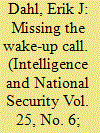

|
|
|
|
|
| Publication |
2010.
|
| Summary/Abstract |
After major intelligence failures it is often asked why intelligence and security officials failed to heed the many 'wake-up calls' that had been provided by earlier failures and surprises. This article addresses this question by examining intelligence failures as 'focusing events', which is a concept used in the literature on government policy making to explain how disasters and crises can stimulate policy change and help organizations and decision-makers learn. It argues that in order for an intelligence failure such as a major terrorist attack to inspire improved intelligence performance - to be a true wake-up call - that failure must not only act as a focusing event to bring more attention to the threat, but it must also lead to increased intelligence collection and greater receptivity toward intelligence on the part of decision-makers.
|
|
|
|
|
|
|
|
|
|
|
|
|
|
|
|
| 10 |
ID:
114691


|
|
|
|
|
| Publication |
2012.
|
| Summary/Abstract |
The goal of this article is to challenge the assumption of rationality in the behavior of decision-making units involved in security, defense, intelligence and warfare and to consider the influence of "motivated bias" in such instances. A review of motivational literature within international politics and a discussion of literature applying "motivated biases" to warfare and strategic surprise will offer an alternative view of the primacy of rationality in such decisions.
|
|
|
|
|
|
|
|
|
|
|
|
|
|
|
|
| 11 |
ID:
108494
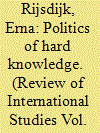

|
|
|
|
|
| Publication |
2011.
|
| Summary/Abstract |
Questions of uncertainty and responsibility have been central to the political and legal investigations of the failed UN/Dutch peacekeeping mission in Srebrenica. The official Dutch NIOD report on the peacekeeping mission has reconstructed the fall of Srebrenica as a surprise attack and as an 'intelligence failure'. The report and its understanding of tactical uncertainty has led to a call for more intelligence in UN operations. I argue that the report builds its claims on a problematic epistemology of intelligence studies drawing upon a politics of 'hard knowledge'. A similar epistemology can be identified in the proceedings of the war crimes tribunal in The Hague (ICTY) in the legal approach of criminal intent for the violence in Srebrenica. Although it is recognised that the political responsibility to prevent genocide and the juridical responsibility to punish those who have committed crimes have different implications for what can be called relevant foreknowledge or criminal intent, both the juridical and the political approaches close off paths for the mobilisation of histories that are more sensitive to the productive workings of language and images and thus to their bearing on possible futures.
|
|
|
|
|
|
|
|
|
|
|
|
|
|
|
|
| 12 |
ID:
133415
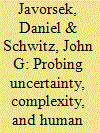

|
|
|
|
|
| Publication |
2014.
|
| Summary/Abstract |
Geopolitical dynamics associated with nuclear proliferation, the Arab Spring, the rapid rise of Chinese power, an oil-fueled Russian resurgence, and the post-Afghan and Iraq eras will demand significant changes in intelligence focus, processes, and resources. Nearly a decade after intelligence failures required a restructuring of the Intelligence Community with mandates for a scientific approach to intelligence analysis, current efforts continue to focus on overly deterministic individual analyst methods. We argue for a process-oriented approach to analysis resembling the collaborative scientific process successful in other professions that is built on shared theory and models. After demonstrating that events in the real world are path dependent and contingent on deterministic and random elements, we highlight the role of uncertainty in intelligence analysis with specific emphasis on intelligence failures. We then describe how human agency in an interconnected and interdependent system leads to a landscape of dancing strategies as agents dynamically modify their responses to events. Unfortunately, the consequences of the present deterministic intelligence mindset are significant time delays in adjusting to emerging adversaries leading to an increased susceptibility to intelligence failures. In contrast with the existing analyst-centric methods, we propose a risk management approach enhanced by outside collaboration on theory and models that embrace lessons from the twentieth-century science of uncertainty, human agency, and complexity.
|
|
|
|
|
|
|
|
|
|
|
|
|
|
|
|
| 13 |
ID:
094081
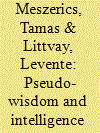

|
|
|
|
|
| Publication |
2010.
|
| Summary/Abstract |
Almost all the strategic surprises that the major powers suffered in the last one hundred years are at least partly attributable to some form of intelligence failure. For the United States the new millennium started with two major failures of this sort: the terrorist attacks of 11 September 2001 and the absence of weapons of mass destruction in Iraq. Naturally, the ever-growing literature in Intelligence Studies treats this topic with special emphasis, at least on a par with other salient issues such as the consumer-producer interface and/or the perennial question of politicization. Despite the widespread attention, no single definition of intelligence failure commands a wide-enough consensus within the discipline or among practitioners. Though obviously related to strategic surprise, whether these should be lumped together with tactical-level shortcomings in intelligence is unclear. Failure can occur at different stages of the intelligence cycle, and distinguishing between these phenomena is probably desirable. However, in the major historical cases, telling apart the otherwise conceptually distinct tasking failure from collection failure, or both from analytic failure and dissemination failure, has proven to be rather difficult. Noting these complications, the focus hence is on analytic failures of a strategic nature.
|
|
|
|
|
|
|
|
|
|
|
|
|
|
|
|
| 14 |
ID:
145243
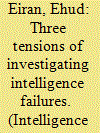

|
|
|
|
|
| Summary/Abstract |
This paper offers a framework for analyzing governmental inquiries into intelligence failures. The paper argues that all investigations face three inherent tensions over their timing, purpose, and process. The benefits and disadvantages of conducting inquiries immediately after the intelligence failure or years later, engaging in investigations designed to ascribe blame or find solutions to endemic intelligence problems, and conducting adversarial, legal-style investigations or collaborative inquiries, are all discussed. In many cases, but not always, the two first tensions are exacerbated by the politicization of the inquiry. Using examples from governmental inquiries around the world, the paper investigates each tension and offers some strategies for mitigating them.
|
|
|
|
|
|
|
|
|
|
|
|
|
|
|
|
| 15 |
ID:
137976
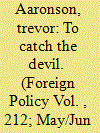

|
|
|
|
|
| Summary/Abstract |
On an otherwise ordinary night in May 2011, Robert Childs realized his friend, Abu Khalid Abdul-Latif, might be on the verge of becoming a terrorist. The two men, who attended a Seattle mosque together, ate fried chicken at Abdul-Latif’s small apartment with his wife and young son. Afterward, Abdul-Latif walked Childs to the dimly lit parking lot outside his building, where his guest’s orange 1979 Chevy Suburban was sitting. There, he posed a startling question: Could Childs help him get some guns?
|
|
|
|
|
|
|
|
|
|
|
|
|
|
|
|
| 16 |
ID:
118369
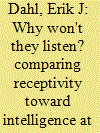

|
|
|
|
|
| Publication |
2013.
|
| Summary/Abstract |
After surprise attacks and other intelligence failures, the complaint is often heard that if only decision-makers had listened more closely to the warnings they had received, disaster might have been avoided. But even though it is generally agreed that intelligence is of little use unless it is received and understood by policymakers, we actually know little about why some leaders are receptive toward intelligence, while others are not. This article argues that the willingness of decision-makers to listen to intelligence depends primarily on two factors: their belief in the seriousness of the issue or threat involved, and their trust in the utility of intelligence. It examines contrasting receptivity toward intelligence in the cases of Pearl Harbor and the Battle of Midway, and suggests that our current models of intelligence-policy relations need to be revised.
|
|
|
|
|
|
|
|
|
|
|
|
|
|
|
|
|
|
|
|
|